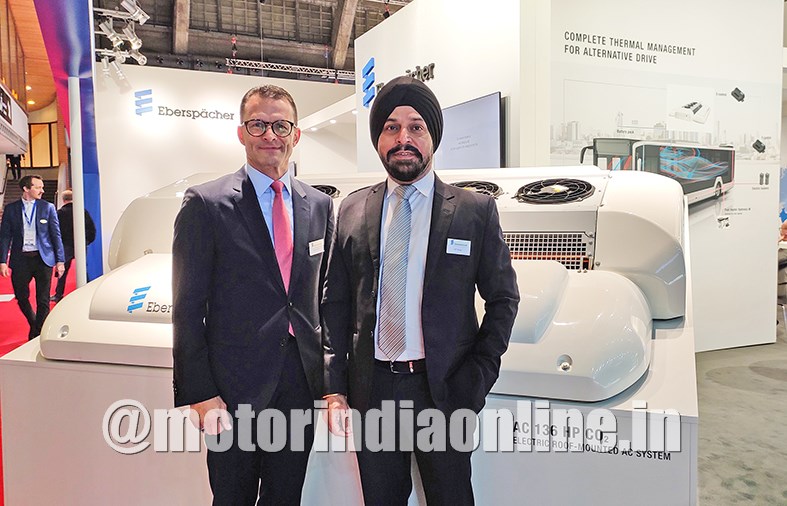Known for innovative products and services from their three Divisions Exhaust Technology, Climate Control Systems and Automotive Controls, the Eberspächer Group is one of the world’s leading system developers and suppliers for the automotive industry. At Busworld Europe 2019, the company showcased an emission-free bus air-conditioning solution for electric city bus transport.

Speaking to MOTORINDIA, Oliver Wels, GM, Eberspächer Bus and Coach, explained: “Being a regular participant at the show we have seen that electromobility is no longer a trend – it is reality. We have been following this growth over the last six to eight years and have developed platforms that are adapted to these requirements: Mainly in the city bus sector, we offer air-conditioning systems that are specifically tailored to electric and hybrid vehicles and the use of alternative refrigerants. The AC 136 platform, which we are showcasing, is available for conventional as well as electric drive and uses – depending of the climate zone – the refrigerant R134a or CO2. With the expected production start of the AC 136 HP CO2 in 2021, we are increasing the efficiency of air-conditioning and heating in electric and hybrid buses and support the emission-free electric city bus transport.”
As one delves deep into the product specification, the AC 136 HP CO2 enables, thanks to its reversible refrigeration circuit, various cooling and heating outputs of up to 22 kilowatts in one system. This way, the heat pump technology ensures the passenger compartment is at the right temperature at all times of the year.
Eberspächer provides also latest technology on heating elements and components: “We are offering the complete thermal management for buses of all drive types – from heat pumps and air-conditioning systems to water heaters, auxiliary heaters and heat convectors. These technologies operate very efficiently and thus extend the range of the electric buses,” informed Wels.
Electric heat pumps, like the AC 136 HP CO2, draw their heat with a high COP value (Coefficient of Performance) from the ambient air. In this way, they not only heat the out blown air much more efficient than additional electrical air or water heaters, but also reduce the load on the bus battery. In addition, CO2 allows the heat pumps to operate in lower temperature ranges than chemically produced refrigerants. This way, the AC 136 HP CO2 requires no additional electric heating load from the bus when used at temperatures as low as minus 15 degrees Celsius: The complete thermal management system thus extends the range of electric buses in temperate climates and offers great advantages for fleet operators of electric city buses.
With respect to India, even though the current automotive market may be going through the slowdown, the India bus industry is poised for growth. Many OEMs are working on orders for electric buses for the STUs. Keeping the future road map in mind, Eberspächer Bus and Coach is also expanding in India. “We have enlarged our production facility in Bangalore as this is the time to invest and prepare. Moving to a new facility has allowed us to have line for all electric systems as required by the OEMs. Need for quality air-conditioning has increased in Indian buses and we are very well placed to handle the same,” said K.P. Singh, MD – India and Head – APAC, Eberspaecher.